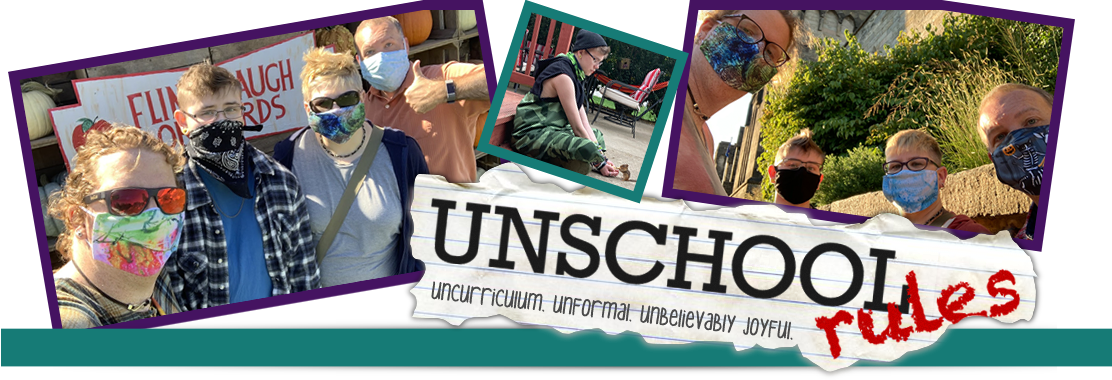
In our family, we don’t “do” subject areas. We don’t really do tests, quizzes, essays or worksheets.
We’re radical unschoolers, and we believe that learning happens all the time, and for us, it rarely happens in tightly defined areas like “social studies” and “grammar.”
That said, I get a lot of questions from people who are unfamiliar with unschooling and wonder, “But how do you teach math?” (Or any other subject!)
That’s why I agreed to take part in the iHomeschool Network’s “5 days of…” Hopscotch series this week, in which I’m joining a bunch of my fellow bloggers to share how we “teach” language arts, math, science, history and fine arts.
It’s a little bit of a trick… because I’m not going to talk about teaching at all.
Instead, I’m glad to share how we learn, radical unschooling, eighth-grade-ish daughter style!
If you wonder how our learning happens “beyond the curriculum,” read on. Today, we’re tackling my favorite subject, unschooling math, and sharing some looks at how it happens in our lives.
Unschooling and real-world math
This is actually such a big thing in our lives that I gave it its own five-day series in July 2012!
 I hope you’ll check out five days of real-world math.
I hope you’ll check out five days of real-world math.
In that series, I share posts about the math you need at the grocery store, the math you need in your kitchen, the math you need to manage your money and the math you need to play sports and do other fun stuff.
I also share my list of top real-world math resources you’ll love – our key to unschooling math at a practical level.
Unschooling and algebra
Because my daughter, Ashar, is now a teenager, the question I’m most often asked is about algebra. I admit that this makes me smile sometimes.
To be blunt, Ashar’s arithmetic knowledge (like, 7 times 8) is sometimes not the strongest. HOWEVER. She does algebra for fun, and does it well.
It actually started with science. Ashar decided on her own that she wanted to learn chemistry this year. While we haven’t been working straightforwardly through any particular text or lesson plan for this, she’s hit on something she really seems to enjoy…
Balancing chemical equations. She starting doing this via Uzinggo and moved on to doing some other examples she’s found in a variety of sources.
This is 100% algebra, and somehow Ashar finds it fun – because it has a practical application to a topic she enjoys.
Meanwhile, because there are REALLY only so many chemical reactions you can balance, in our quest to find her something similar, we started playing around with the DragonBox algebra app. I say algebra app, and that’s really what it is, but Ashar treats it like any other app game for her iPod Touch, and she’s enjoyed flying through the first five “worlds” of levels.
One thing I need to be really clear about: We’re not doing these things because we they’re algebra. We’re doing them because Ashar is interested in them, and the fact is, it’s cool that we can ALSO say, “Oh, hey, by the way, did you know that you now know how algebra works?”
Fundamentally, algebra is about sitting a system of equations on top of the real world. DragonBox has helped Ashar see all the ways you can conceive of and manipulate those systems; Uzinggo has shown her an example application of when you might apply such a system and why.
But the thing that fits in with that is that we aren’t trying to have “algebra course” come out of this. We’re not doing algebra worksheets to solve for X. While we’re occasionally diving into the stories in Life of Fred: Pre-Algebra 1 with Biology, we’re focused MUCH more on the biology piece of that, actually, as the math is a little simplistic at this point. (And we’re doing this infrequently – just as it catches our interest among our other reading!)
What we are doing is using the things Ashar has already encountered on her own to start conversations that drive us deeper. We might not work out algebra problems even weekly, but we talk about how algebra works in everything from grocery price calculations to our family budget almost daily!
Unschooling and advanced math
“But what if she needs to learn trigonometry or calculus?”
Well, my answer to that is simple – if Ashar wants to or needs to learn those things at any point, I know that she has the skills needed to do so, and I know that I can help her, either directly or by putting resources in her path. (I’m looking at you, Life of Fred college series!)
The bottom line is, as a math major, I learned one thing above all else. Advanced math is NOT about computation or memorization. It’s about knowing how to learn, which is very different.
And I’m confident that my daughter is doing great at learning to learn, which means I’m not worried about advanced math in the slightest, should her need for it arise!
Side note: Since I mentioned Life of Fred, I want to add that while it is described as a Christian series, we are a secular homeschooling family and haven’t had any problems using the fairly few spiritual references we’ve found as talking points about what different people believe, which we like to do anyway.
The rest of the series
Monday: The power of words: Unschooling and “language arts”
Today: It’s not all about numbers: Unschooling and “math”
Wednesday: Exploring the world and how it works: Unschooling and “science”
Thursday: You can’t escape the past: Unschooling and “history”
Friday: There’s beauty in everything: Unschooling and “fine arts”
More great resources for homeschooling and unschooling math
 This post is also part of the iHomeschool Network’s Massive Guide to Homeschooling Math.
This post is also part of the iHomeschool Network’s Massive Guide to Homeschooling Math.
Click the image to read many, many more posts full of great math advice!
Also, if you’re into the things we do in our family homeschool, check out my previous “5 days of…” series, 5 days of real-world math.
Finally, this post is part of the How to Teach Without a Curriculum linkup through the iHomeschool Network. Click the image below to read more posts on teaching without formal curriculum!



I approach math the same way you do. Only Katie has ever had a math worksheet. Poor girl, since she was my first, I homeschooled her just like a traditional school…that was before I knew better…LOL
Haha, I’ve only got Sarah, so she gets the bad AND the good. I did start out asking her to do one math worksheet a day – I think that lasted a week? It was awful!
I was above-average in math in school (until pre-calculus knocked me out). But, looking back, I think my outside-of-school interactions with mathematics were just as valuable, more memorable, and perhaps more applicable to the real world I ended up living in. Some examples:
— Just sitting around and playing with a calculator.
— When I was younger, my mom and I would take one of those old Sears-Roebuck catalogs reprints (from, say, 1905) and we’d pretend we had $100 to stock our new house on the frontier. It necessitated making wise “purchases,” keeping track of balances and more.
— Playing Monopoly teaches a LOT about money and math. (For kids AND adults.)
— Baseball statistics, baseball statistics, baseball statistics. Sports can help teach so much math. Winning percentages, batting averages, games behind. I kept track of statistics (real and fantasy), absorbed the newspaper agate and the backs of baseball cards, and could, at one point, tell you the all-time home run leaderboard. By middle school, I was figuring our fun problems like this: If Mike Schmidt has 10 home runs in 40 games, how many is he on pace to hit this season? X = 1620/40. Algebra, folks. Cross multiplying was my friend, and it turned out to have uses in so many other areas of my life.
— Math certainly figured into some of the recreational computer programming (BASIC) that I did at home.
And those are just some things off the top of my head.
Ooh, great examples!! I definitely did a TON of calculator-ing. That’s something I can actively remember considering “fun!”
Thanks sooooo much for the great ideas! We’re here in Australia, so I’ll definitely be doing stats from our biggest sport – Aussie Rules Football. But we’re a sport mad house and I didn’t even think to link sport in with our homeschool like that. We also play Monopoly a fair bit already, and I love the idea of using catalogues too! Cheers!
Emily, that’s awesome! I love that your family can work in a topic you love to your learning – that’s the best feeling!
I homeschool my 5 children and because their ages and learning styles are so different,I decided to ‘unschool’.During this summer,my 2 eldest daughters decided to have a rabbit business.They had to buy veggies,pellets,hay,etc.They learned how much they were spending and how much they were going to profit.They learned multiplication,division,subtraction through weighing out veggies and fruits for their rabbits food.We don’t test because LIFE is the test!
Tammy, that’s exactly my point – if you can live your life, you passed the test! I’m so glad your daughters enjoyed their rabbit business! 🙂
I love this! My son has a passion for prehistoric creatures. He has learned about the metric system (Length & Weight) because he wanted to know more about these creatures. He begged me to sign him up for a free online dino class starting in September because of this passion. If he enjoys this upcoming class, who knows what other maths/sciences he will want to learn because it coincides with his passion.
Exactly!!! That is what I love so much about math-as-it-matters; it becomes not something off in a silo, but something that’s part of a broader topic. Which is how the real world works anyway! 🙂
I have unschooled my kids for eight years and four years ago I reverted to Islam. This is when I learned not only why it was invented but we also now have a real world reason for knowing it. FYI: it’s used to figure out inheritance.
Isn’t it amazing what you find out – and in the neatest ways? This is why I love real-world math!